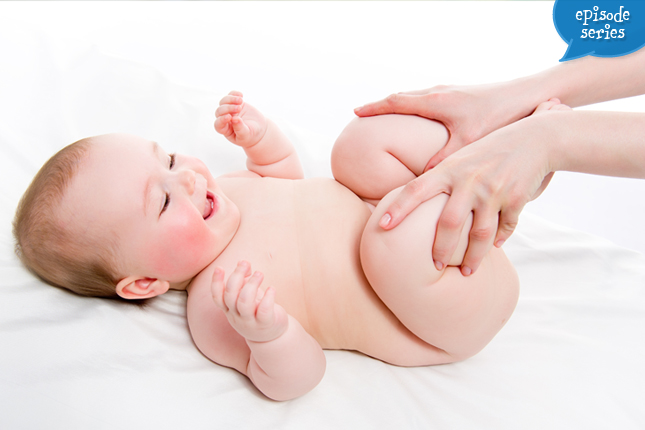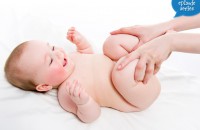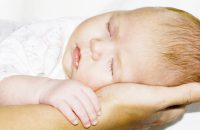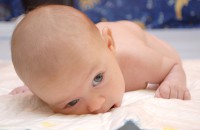Parent Savers
Baby Skin Conditions: Eczema
Please be advised, this transcription was performed from a company independent of New Mommy Media, LLC. As such, translation was required which may alter the accuracy of the transcription.
[00:00:00]
[Theme Music]
Ahmad Bailony : Most kids will develop an itchy rash at some point in their lives, but at least 1 in 10 of them are subjected to these more regularly, with a skin condition that most have heard of, called eczema. But what's really happening when your baby has eczema? And most importantly, what can we do as parents to help our babies feel better? I am doctor Ahmad Bailony and today we are talking about baby eczema.
[Theme Music/Intro]
Johner Riehl : Welcome back everybody to Parent Savers, broadcasting from the Birth Education Center of San Diego. Parent Savers is your weekly online on the go support group for parents of newborns, infants and toddlers. I'm your host, Johner Riehl, and thanks again for all of our loyal listeners who joined the Parent Savers Club. Our members get all of our archived episodes, bonus content after each new show, were we do some kind of a special conversation with our expert, extending the show. And plus, we also have special giveaways discounts that we offer to our members. You can subscribe to our monthly newsletter for free though, if you're not already a member, and you can get a chance to win a membership to our club each month, or at very least just get our newsletter every week. Another way for you to stay connected is by downloading our free Parent Savers app, available on Android and iTunes market place, and then you will automatically be notified and know when a new episode is released. So let's go around the table and talk about everyone that's in the room. We've got our panelists as well joining us with Dr. Ahmad Bailony talking about baby eczema. I'm Johner, and I have three boys, Quinner is six, Whitaker is four and Zyler is going to be two soon. And Zyler is the first one of our kids that had eczema. Our first two did not, so we really should have talked to you and learn a little more about it, 'cause it's something that we're dealing with with him.
Sunny Gault : And my name is Sunny Gault, I am the host of Parent Savers' sister show, Preggie Palls, which is all about pregnancy. I am pregnant right now with our third, we don't know what we're having yet, we're due in December. And I've got two little boys at home, Sayer is almost three, Urban just turned one. And Sayer does have some skin stuff that I'll be asking you about. I don't know if it's eczema, I don't know if it's just something that runs in the family, but I'm curious to figure it out.
Ahmad Bailony : Every kid has some skin stuff.
Laurie Babb : And I'm Laurie Babb, and I'm a local business owner, and I have two kids, two boys, Lorenzo is 5-years-old and Marcello is two and a half.
Ahmad Bailony : So a lot of boys.
Sunny Gault : Do you have any kids?
Ahmad Bailony : No, no kids. My parents would like me to have kids.
Sunny Gault : That's a whole other episode, really.
Ahmad Bailony : Yeah, let's not get into it.
[Theme Music]
[Featured Segments: Ask the Experts]
Johner Riehl : Now we have a Twitter question from Kim. Kim writes, “How do I get my 11-month-old to sleep through the night? She still gets up for one bottle and then she'll go back to sleep immediately”.
Joanna Clark : Hi, Kim! Great question about your 11-month-old not sleeping through the night regarding the bottle. This is Joanna Clark with BlissfulBabySleepCoaching.com here to answer your question. A baby that is 11 months of age that is still waking up for a bottle at night, often this is a situation where their hunger clock is still turned on in the middle of the night, and what I mean by that is that they're expecting calories, in the middle of the night, when we really want to be shifting those calories to the day time hours. So the first thing I suggest you do is kind of go back and take a look and see how well all of the feeding has been going regarding integration of solids during the day time. And obviously, having conversations with your pediatrician is going to be super important, you're going to want to go to your pediatrician, talk to them about your concerns regarding nutrition, and feeding, and expectations for the amount of milk your child should be having this period, and their personal opinion on what time of the day the milk should be showing up. Sometimes children at this age tend to be drinking a tone of milk during the day and less solids, therefore turning back on the hunger clock at night. So just simply taking a really close look at what the integration of solids are in your household can really make a big difference. Now, obviously sleep and nutrition can sometimes be linked, so I also highly suggest that if you have further concerns and your pediatrician is unable to answer regarding nutrition, that you reach out to your local lactation consultant or a nutritionist to get more details, and what you'll find when you start addressing the hunger issues for daytime will minimize wakings at night or bottles at this age group, in which case your sleep problems might actually solve themselves. So that is something to consider, and I would definitely get in touch with your pediatrician on this particular question regarding feeding and nutrition. Take care!
[Theme Music]
Johner Riehl : Today's topic is baby eczema, and it's one that many families have some experience with, or at least, as Dr. Bailony says, some sort of rash with their kids. So today we're talking to doctor Ahmad Bailony, am I pronouncing that correct?
Ahmad Bailony : That's correct.
Johner Riehl : Great, he's a pediatrician affiliated with Sharp Chula Vista Medical Center, he's going to tell us all about eczema and baby eczema, including what it is, what causes it, and probably most importantly for you guy listening, what we can do to treat it if our kids have it. Thanks so much for joining us.
Ahmad Bailony : Thank you for having me here.
Johner Riehl : Alright, so let's start with what is... is there such a thing as baby eczema, is that even a thing, am I making up a concept that's “baby eczema”?
Ahmad Bailony : You are not making up a concept, there is such a thing as baby eczema. In fact, eczema in general with people who get it, about 50% will get it before the age of 1. So baby eczema is a very real thing, we've seen it and as kids, in my clinic, a couple weeks old, and pretty much goes on from there to sometimes even adulthood.
Johner Riehl : So what is eczema and baby eczema?
Ahmad Bailony : I think that we as people kind of forget that our largest organ in our body and one of the most important is our skin. A lot of times we just kind of take that part for granted, we think about important organs, your heart, your brain, but your skin is a very important organ and eczema is pretty much a defect in that skin. I think we take for granted that our skin does a lot, it protects water and moisture from getting into our body and when there is a problem with that, that's what we call eczema. So it's actually a problem with your body's ability to retain water. So, obviously, when you're having problems retaining water, your skin tends to get very dry, very itchy, and those kids have a very hard time dealing with things like sweating, things like moisture, humidity.
Johner Riehl : I think that's kind of for tissue, I think anytime there is a rash or something on the skin, you think what's the external influence that's causing it, not necessarily that there might be something wrong with the skin.
Ahmad Bailony : And the classic thought actually, the older doctors, I'm 31, but before me the thoughts about eczema used to be the opposite. They thought that there was this external factors, and that eventually because of an environmental allergy or whatever it may have been, kids would scratch and they would get eczema. The thought nowadays is actually reversed, that the problem actually lies in the skin due to genetic issues with proteins and the actual skin, and then environmental factors can contribute to it, but the problem's actually in the skin.
Johner Riehl : The problem was there the whole time.
Ahmad Bailony : Yeah.
Sunny Gault : I guess how early can we see these signs in our children? I mean is this something like, boom! Baby comes out and you can tell right away?
Ahmad Bailony : So it's not something like boom! Baby comes out!
Sunny Gault : I host a pregnancy show, come on, we talk about this stuff all the time!
Ahmad Bailony : I realize you're pregnant, but... it's usually like, for example, I'll get a kid in the office and they'll come in for their one month check-up and mom will say that the kid's been doing fine, but I've noticed like behind the ear there's this dry itchy spot, and he kind of wants to itch on it but he's one month though, doesn't really know how to get there. And you take a look behind there and you see like dry, reddened kind of flaky skin, that's kind of first early warning signs of eczema. So it can start like I said at about a month-old, but it's not something like your kid is going to be born and has eczema right away.
Johner Riehl : But it probably is there? It just isn't showing.
Ahmad Bailony : Right. Newer research have actually identified – I don't want to get to nerdy – but they've identified some actual proteins in the skin that are highly linked with eczema.
Sunny Gault : So is it a certain something that causes it to flare up?
Ahmad Bailony : There's lots of things that causes the flare up. Number one, and probably the biggest thing is that eczema is a cycle. The problem with it is that when the skin becomes like that, it becomes very itchy. And so anybody, especially children, if the skin is itchy, they're going to scratch it. They're not going to be like, “I'm not going to scratch my skin”, and whenever you scratch the skin, anytime, we're talking about the skin already itself is disfunctional, so when you're scratching it you're making it worse. Secondly, any type of moisture. When the problem with the skin is retaining moisture, when you're making it wet it's going to get dry really really quickly after it gets wet. For example, a long shower, as soon as you get out of the shower, that moisture that was on the skin is going to evaporate really quickly and that's going to lead to more dryness.
Johner Riehl : It's interesting, 'cause you would think that if it's a lack of moisture than giving it moisture would help.
Ahmad Bailony : Giving it moisture does help, but you need – again, we'll talk about this with the treatment part more – you need something that would retain that moisture. It's that the skin can't retain that moisture. So when the skin can't retain the moisture what happens with any kind of liquid is that it will evaporate and eventually going to make it more dry.
Johner Riehl : And than that leads to what you've talked about, flaky.
Ahmad Bailony : It leads to very flaky, thickened, reddened skin which is just severely itchy. And like I said, that's that big flare up thing. When the skin becomes like that, you're natural instinct, especially when you're a toddler, is to just scratch it. Scratching it makes it worse. There are other things that can lead to flare ups. For some people, infection, a big problem these days, I don't know, in the news, is MRSA, which is a type of skin infection, a very strong bacteria that can live on the skin. We see sometimes kids with eczema are colonized with that infection on their skin. Those kids have obviously worse flare ups than a kid who has no infections. There's a long list of things that can cause flare ups eczema. But the number one biggest criminal is just scratching the skin though.
Johner Riehl : Now there are certain areas that are more prone to eczema appearing?
Ahmad Bailony : There are. So when we're talking about eczema we kind of group it into three age groups. There's what we call baby eczema, that's up until age 2, than what we call childhood eczema, usually between 2 and 12, and then there's adult eczema, anything above 12. As pediatricians we don't deal with adults. So yeah, there are certain areas. The areas depend on what age you are. In babies, we tend to see eczema more on the cheeks of the face, on the scalp or on what we call the extensor services, for those people listening that can't picture that, it's your elbow basically. So the outside, wherever your skin would flack, it's the other side of that.
Johner Riehl : Like the back of the knee?
Ahmad Bailony : Right. Where the back of the knee is where it folds, so it would actually be the opposite of that.
Johner Riehl : So the front of the knee? Yeah. I want to make sure I was understanding, and I wasn't, so thanks for that. What is a mild case versus a severe case, 'cause I heard that in relation to eczema.
Ahmad Bailony : So mild case, back when I was talking about that kid who is one month-old that came to be seen with a little rash behind his ear, that's a mild case. Or like a kid who comes in and just on the elbow there is a small patch of reddened skin, that's a mild case. A severe case you will definitely know when you see, I mean there are some kids I have that come in and literally every joint that you can think of has eczema. Those are severe cases, they're very itchy, what we call A topic kids, A to P is a word that we use a lot and it means out of place. Those severe cases are very very difficult to deal with as a pediatrician just because you feel how badly the patient coming in looks, in obvious discomfort. Those kids do not look like they're having a good time, very difficult to deal with.
Johner Riehl : But if a kid has eczema behind their ear, does that mean that they have it all over on their skin? And it just is a matter of whether it will flare up, or is it localized to those certain areas?
Ahmad Bailony : Every case is different. For example, I've had some patients where we'll treat one area with eczema, and it goes away and we really don't hear about it again. And then there's other kids who it starts in one area, as they kind of grow, it tends to spread. What causes one kid to be more in the severe category versus the kid with the mild is really hard to know. I think that's a lot of were research is at this time, there's a lot of papers being published about certain chromosomes, and certain chromosomes make people more likely to have eczema than others, so I think that as we kind of are in this area, we're studying genomes and genetics, that's probably something more up and coming in the next five to ten years. As of right now, what makes a kid more mild versus a severe is hard to know, unless there is an obvious thing, the kids eats a food and it becomes very allergic or something.
Sunny Gault : Right, so that was my question about diet. The kids are also if the mothers are breastfeeding, I heard that that's linked somehow.
Ahmad Bailony : Food is a very very controversial subject when it comes to eczema.
Johner Riehl : It's a controversial subject in general.
Ahmad Bailony : Yeah. Having said that, there isn't a clear link between food and eczema. There are two different things that we're talking about, there's eczema, which is a big problem, but there is also food allergies which are a big problem. It doesn't mean that if you have food allergies that's what's causing your eczema. 'Cause, as we talked about, eczema is a genetic problem in the skin with the protein in the skin. It may be, in very rare cases where for example, let's say, I've been treating a kid for eczema for months and months and months and I really can't make any progress, and I'm at my very wits, and I'd check a skin test to see if there is any food allergies. That's a more rare case. In general, eliminating foods and things like that isn't something we actually jump to right away. Especially in these times, we tend to blame food a lot in the modern times. Sometimes you'll drive a parent crazy, they're going to start eliminating everything and their kid is on this terrible diet and really it's not doing anything for their eczema, that's a disservice to both the parent and the child. Not something I want to do as a pediatrician.
Laurie Babb : I know a lot of times when I see children with what looks to be like a rash or a skin condition, I immediately think, “Oh my gush, that's contagious, get it away!” Is that the case with baby eczema? Is it contagious, should we be concerned about our kids playing on the playground or anything like that?
Ahmad Bailony : The good news is that eczema is not cooties,
Sunny Gault : Which we have cooties spray for so it's OK anyway.
Ahmad Bailony : So you don't even have to by the cooty spray for this, 'cause it's not contagious. There are, like we talked about with those kids, if there's a kid that's super colonized with an infection, than yeah, obviously, a kid can spread MRSA or a skin bacteria to another kid, but those are more rare cases and we're talking about kids with very severe eczema, to the point where their skin is actually weeping and bleeding. But in general, a kid with routine everyday eczema it's not contagious, it's a genetic thing.
Johner Riehl : So is it more likely to run in members of the family?
Ahmad Bailony : It is very likely to run in members of a family, that's why one of the important questions I always ask when I'm looking at a rash, mom comes in, “I've got this rash, I don't know what it is”, is there anybody in the family with eczema? A very important question, there are studies that show that in twins, who are what we call monozygotic, identical twins, the rates of eczema are up to 80%. So that kind of tells you there that it's a genetic thing, it runs in families.
Johner Riehl : What about boys and girls? Do boys get eczema more than girls or vice-versa?
Ahmad Bailony : Even though boys get cooties probably more than girls...
Johner Riehl : But eczema's not cooties.
Ahmad Bailony : You heard it here first! It's not cooties. Girls are actually a little bit more predominant, it's about 1.3 to 1, so not very much, just a little bit more.
Sunny Gault : Is baby eczema just a baby thing, or is it something that predicts a life long condition they'll have?
Ahmad Bailony : About 40% of people will actually just outgrow the eczema, they will never hear of it again.
Sunny Gault : That's good.
Laurie Babb : Is that with continuous treatment though?
Ahmad Bailony : Yeah, it's not necessarily continuous, to talk more about what to do in terms of treatment, the other 60% a lot of them will go into what we call remission. They pretty much live life as an adult, normally, every now and then, if they go into a very dry place, no humidity, that's going to flare up their eczema. Or they do an activity where they sweat a lot, a ten mile hyke in the sun, that might flare up their eczema. But otherwise, they're in remission, they're not like constantly just living with it. It's a very more rare case where someone goes into adulthood and still has the severe eczema that they had in childhood.
Johner Riehl : Well I don't know about you guys, but my skin is kind of itchy right now, so I think we need to take an itch break, we'll be right back, we're going to talk about some treatments for kids as well as preventive steps and also maybe I'll talk about what's going on with my son, of course you've got a doctor in the room so you got to ask him a question. Alright, we'll be right back.
[Theme Music]
[00:19:49]
Johner Riehl : Alright, welcome back everyone, we're talking all about baby eczema, with doctor Ahmad Bailony, from Sharp Chula Vista Medical Center. We learned a lot in the first segment about kind of what it is, what it's not, it's not cooties, and now let's talk a little more about what we can do to treat it. Because as parents we want to help our kids out and get a relief from that crazy scratching they're doing, and in some cases they're scratching themselves raw, so what are some treatment steps when you do see someone with baby eczema, what are some treatment steps that you recommend?
Ahmad Bailony : Whenever I talk about eczema, 'cause you can always go into a room and I think in general overwhelm someone, especially if their kid comes in and they've had this really bad eczema and they're looking at you, the pediatrician, with these wide eyes, like, “Help me!”. If you just flood them with information they go home and generally it's hard to keep up with what the doctor said in five minutes. So I like to spread it into three general categories. Number 1, and the most important by far, if you look at eczema as a pyramid of treatment, this is the big bottom of the pyramid, where all the structure is, is moisture. And moisturizing the skin. Moisturizing the skin is number 1, number 2 would be a lifestyle modification, things like trying to figure out how to keep your kid from actually scratching the itch, how to keep your kid from like not sweating too much during really bad flare ups. If there's someone in the house that's smoking, those kind of allergic triggers minimize those things, dust, those kind of things in the environment. And then number 3 is medications. There's a lot of good medications for eczema, but I don't like to make those the focus of something because any medication can have side effects. So, if we can get the first two done, and make the medication part as little as possible, that's kind of the best way to go.
Johner Riehl : I guess I should probably clarify, 'cause I've asked you about medication, but there's no cure for eczema, is there?
Ahmad Bailony : There is no cure for eczema. Like I said, a lot of kids will outgrow it, so it's not like just because there's no cure it's never going to go away. There are things to make it better, there just isn't a cure you can take or a spray that you can put on, there is no cootie spray for it.
Sunny Gault : So the medications that you said, I heard that steroids can be part of the treatment? And some people I guess would be concerned about that. What's your take on that? What do you tell parents?
Ahmad Bailony : Steroids is a big subject. What I generally tell parents is that the main problem with eczema is that you have, like we talked about, this problem in your skin, a protein in the skin that's not working so well, so it's not being the barrier that it's supposed to be. So what steroids do is in those periods when the kid is really flared up and having all this inflammation, a steroid is an anti-inflammatory. It goes in there and it stops that skin from being so angry. Kind of like how a sports athlete, when they have swelling in their knee and we hear about them getting an injection in their knee to calm the swelling, it's the same kind of subject.
Johner Riehl : But hopefully not steroids for athletes.
Ahmad Bailony : This isn't the same steroids that help athletes. It is a loaded word, there are a lot of side effects with steroids, if you look at the list of side effects, it's endless. I don't want to even go into that, 'cause it would be a whole other show. The good thing and nice thing about eczema is that really, in general, if you go to your local pediatrician, with a coming case of eczema, the steroids you are going to get are very very low steroids. We're talking about something like a hydrocortisone, is probably the lowest possible steroid you can get. It's on the skin, so it shouldn't have a high systemic absorption. So as long as you're doing the other things that we've talked about, moisturizing the skin really well, keeping it really well hydrated, you really shouldn't have to use those steroids that much. Obviously, in a kid with severe severe eczema, those kids should be seeing the specialist anyway, and kind of having those steroids managed by a specialist. But if you're going to your local pediatrician, take a one week, two week course of steroids on your skin for eczema, it shouldn't be anything that's going to cause a lot of side effects.
Johner Riehl : I know for our son, Zyler, who is almost two, it really flared up around his first birthday, and we have some steroid cream that we put on and it helps, and there is other types of creams that help as well too. But another thing that – and maybe you girls are better at this, I think my wife is a little bit – but there's a lot of talk about lotions, and ointments, and creams, and those aren't all synonyms, they are named that or a reason and they're different. Can you talk a little bit I guess about the difference between those and how they play in to treating the eczema in the skin and helping moisturize the problem areas?
Ahmad Bailony : There is three different things, and this is the big area that we talked about, moisturizing the skin. There is lotions, I basically like to tell my parents: don't ever use lotions. Lotions are mostly water, so when we're talking about a problem like eczema, where you're having problems with water, you don't want to be using something that's mostly water. Lotions we can kind of skip, you don't want to use those. Creams have a lower water content than lotions, so creams are better. I'm sure you guys have heard, there is a bunch of creams out there. And then finally there is ointments, ointments basically have no water, they are just, like, for example, petroleum jelly or what we commonly call vaseline, is an ointment, there is aqua forest ointment. Those are very very good for treating eczema, the reason why is because they don't have any water that keep the skin very hydrated without any water.
Johner Riehl : How does that make sense?
Ahmad Bailony : Basically, if you think about if you put vaseline on your skin, it keeps it nice and greasy, kind of like a pig, which is very good, because the problem with eczema is that your skin is dry, so if you can keep it greasy like that for a long time, than nothing is going to be able to get to that barrier on the skin that's messed up. You have a layer between you and the skin, if you have a layer between you and the skin, your skin is going to do pretty good. The only problem with those ointments is, like I said, they're pretty greasy, so sometimes the kids won't tolerate them so well 'cause they'll be a little sleep and slide, there's nothing to really make them go away, so they play with it too much, you're going to have kind of a little mess, but if you can get your kid to use it, ointments are the way to go.
Sunny Gault : Can you put like a bandage over it or something like that? Because the area doesn't need to breed, you're talking about creating a barrier.
Johner Riehl : In fact, air's bad for it, right? 'Cause the air's what takes the moisture away.
Ahmad Bailony : You could put, one of the treatments again for eczema is to put like a wet wrap actually over the ointment. So that way, what you're going to do is have moisture there that's not escaping, because you're going to have that ointment barrier as well, and that will allow it to be trapped in there, instead of the opposite of what usually happens if you don't have any ointment on the skin, and you just have wetness, than, eventually, that wetness dries out, and that eventually dries out your skin.
Sunny Gault : OK, so I'm thinking summer is on the way, and I know my boys love to get in to a swimming pool. So, is this a bad thing for babies with eczema, 'cause we're putting moisture directly on their skin. What are your thoughts?
Ahmad Bailony : You are putting moisture on their skin, however, if you think about it, when you're swimming in a pool you're not sweating. And if you are sweating, you're a pretty sweaty person, because you shouldn't sweat in a pool. So actually swimming is not bad. The chlorine in the water makes the water pretty sanitary in general, so swimming is fine but you do have to remember that as soon as they get out of the water, they are now in an environment where they aren't surrounded by water, so now that water is on the skin in the open air, you're going to have to hydrate that skin right away with your ointment or your cream or whatever you're using to keep your skin moist.
Sunny Gault : What about swimming in the ocean? Does that make a difference? There's no chlorine in the ocean.
Ahmad Bailony : Swimming in the ocean is probably a little bit riskier just because the salt content tempts to pull moisture a little bit more. I would probably recommend pool over ocean. I haven't said that if you're going to go to the beach one day and you're not flaring terribly, that's not the worst thing in the world as long as every single time you get out of the water you got to hydrate that skin. That's number one.
Sunny Gault : It seems like the sun would probably not be such a great thing.
Ahmad Bailony : Changes in temperature aren't good for eczema, so going from air conditioning in house to outside beach where it's hot, that's not a good thing. But you don't want to start having your child live in a bubble, here, we live in San Diego, which is a nice sunny beautiful outdoor place, you still want quality of life for your patient or your child. So you can still do activities and you want to try and make sure you're not doing things where your kid is getting excessively sweat, you don't want to sign them up for a marathon, but if they're going to go to the beach, have a nice beach day with the family, I think it's OK, as long as you're taking care of the skin.
Johner Riehl : And you're aware of it.
Ahmad Bailony : Right, yeah. Using good sun blocks.
Johner Riehl : OK, so let's recap a little bit, I like to do this at the end of the show. So what is the most important things for listeners to remember today about baby eczema?
Ahmad Bailony : The number one most important thing is really, eczema, like you said, there's no cure, but there's a lot of treatments. And the number one most important thing about treatments, and I try to stress this to parents as much as I can, is hydration. Because if you can keep your kid's skin moist, hydrated, then you're going a lot of the work. You're going to be seeing the less flare ups, it's always a good thing. I try and tell parents literally, as they're leaving the room, as they're walking out, hydrate, hydrate, hydrate. Because if you could that, you're going to be using medications less, you're going to have to ask those questions about steroids side effects, all those things are going to be less of a problem, you're going to see less flare ups if you can simply remember that whenever you do an activity, when you change temperature, when you go to the beach, whatever it may be, especially after you get out of baths and showers, you really got to hydrate that skin.
Johner Riehl : Alright, thanks so much doctor Bailony, for joining us today. For more information about baby eczema or for more information about any of our panelists, or some resources about baby eczema, make sure to visit the episode page on ParentSavers.com. We're going to continue the conversation for our Parent Savers Club members. Actually, this one is a controversial topic that I have read about and was going to ask you about, so this is the one that I was going to ask you about, I was going to ask you about bleach baths. I heard of that as a treatment as I was researching the show, and I figured that would be kind of an interesting controversy to talk about later, not necessarily something to talk about in the normal show. So, for Parent Savers Club members, make sure to listen to us talk about that.
[Theme Music]
[00:32:19]
[Featured Segments: From Our Listeners]
Johner Riehl : Here's a comment from listener Vicky. She writes that she loves the episode on homeopathy and children. She writes, “The show actually gave me last bit of inspiration I needed to take the homeopathy course at a local trade school that I've been debating about taking. Despite the fact that I live outside a major college town, there aren't a whole lot of resources in that area. So it's really exciting to hear the show and get some basic information”. Thanks, Vicky, and we're glad we inspired you!
[Theme Music]
Johner Riehl : Thanks so much, that wraps up today's episode of Parent Savers, we appreciate you listening, don't forget to check out our sister shows, we've got Preggie Palls with Sunny Gault for expecting parents, and our show the Boob Group with Robin Kaplan for moms who breastfeed their babies. They've got a lot of Facebook likes so you're probably listening to them and then maybe checking us out, we'd love to catch up to them so tell your friends about Parent Savers, share our Facebook page so we can catch up with the Boob Group. Next week we're actually going to have a special two part father's day series, along with our sister show Preggie Palls, so that's going to be pretty exciting, it's a lot of fun to put together, we've got some panelists who are dads and expecting dads, talking about what the childbirth experience is going to be like in the baby's first years. So really fun to put together, make sure to check that out next week. Thanks so much for listening, this is Parent Savers, empowering new parents!
[Disclaimer]
This has been a New Mommy Media production. Information and material contained in this episode are presented for educational purposes only. Statements and opinions expressed in this episode are not necessarily those of New Mommy Media and should not be considered facts. Though information in which areas are related to be accurate, it is not intended to replace or substitute for professional, Medical or advisor care and should not be used for diagnosing or treating health care problem or disease or prescribing any medications. If you have questions or concerns regarding your physical or mental health or the health of your baby, please seek assistance from a qualified health care provider.
[00:34:05]
[End Of Audio]












